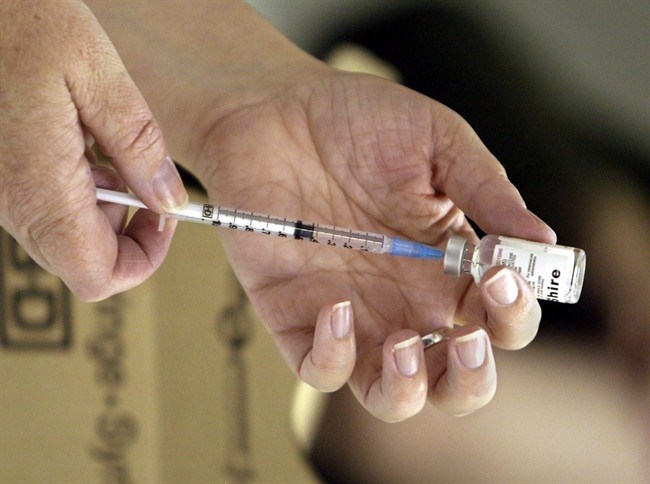
A nurse working for Vancouver Island Vaccine loads a syringe with flu vaccine for injection at the Victoria Clipper Terminal in Victoria Saturday Oct. 23, 2004. A new study suggests that for most people in most flu seasons, getting a flu shot actually lowers their risk of developing a rare neurological condition that has been linked to the vaccine.
Image Credit: THE CANADIAN PRESS/Chuck Stoody
January 15, 2015 - 7:00 AM
TORONTO - In most flu seasons, getting a flu shot will actually lower most people's risk of developing a rare neurological condition that has been linked to the vaccine, a new study suggests.
The research, led by scientists in Ottawa, assesses the net effect of having a flu shot or getting infected with influenza on one's risk of developing Guillain-Barre syndrome.
The upshot? While getting vaccinated against flu slightly increases one's risk of developing Guillain-Barre syndrome, catching the flu increases that risk more.
"The take-home message is that most of the time, in most of the scenarios we're seeing, the vaccination actually reduces your risk," said lead author Steven Hawken, a scientist at The Ottawa Hospital who built the mathematical model on which the research is based.
Other authors of the study are either at The Ottawa Hospital or at several other Ontario-based institutions. The study is published in the February issue of the journal Emerging Infectious Diseases.
Guillain-Barre syndrome is a neurological condition that triggers progressive muscle weakness and in some cases paralysis. Most people who develop it recover, though the recovery period can range from a few weeks to a few years. It is fatal in about four per cent of cases.
It is also rare. In any given year, you would expect to see an average of about 20 cases in a population of one million people, Hawken said. If all one million of those people got a flu shot, the number of expected cases would rise to 21.
All of the causes of Guillain-Barre syndrome are not known. But it is recognized that some infections increase the risk of developing the condition. The U.S. National Institute of Neurological Disorders and Stroke says most cases occur a few days or weeks after the individual has had symptoms of a respiratory or gastrointestinal viral infection.
The institute also says that surgery can, on occasion, trigger the syndrome as can vaccinations in rare cases.
The additional risk posed by flu vaccination was first seen in 1976, during an emergency vaccination program in the United States to protect against what was thought to be an emerging influenza pandemic. The swine flu incident, as it is known, alarmed public health leaders who feared the virus in question would trigger a catastrophic pandemic like the 1918 Spanish flu outbreak, which killed an estimated 50 million people worldwide.
The swine flu virus did not go on to cause a pandemic. But as Americans began to get vaccinated against the virus, an unexpected rise in cases of Guillain-Barre syndrome was observed and the vaccination program was terminated.
The risk of developing Guillain-Barre after influenza vaccination is generally cited in isolation; it is thought to raise the risk by one additional case in one million people. But because flu can also trigger the condition, the authors of this study wanted to look at the net effect.
They developed a model that takes into account the age of an individual (older people are more likely to develop Guillain-Barre), the severity of the flu season, the effectiveness of a particular year's flu vaccine (it varies from year to year) and other factors.
There are rare cases where the risk from the vaccine outstrips the risk from flu, the researchers admit, such as when there is little influenza activity in a particular winter or when the vaccine isn't very effective.
"So basically the rationale is, if there's no flu circulating, then obviously getting vaccinated is going to slightly increase your risk because there is no flu for it to prevent," Hawken said. "And if you don't have an effective vaccine, even if you do get the flu shot it's not going to prevent influenza illness."
But in most cases with normal amounts of flu activity and reasonable protection from the vaccine, getting a flu shot will lower one's risk of developing Guillain-Barre, the model shows.
Even when the balance doesn't tip in favour of a lowered risk, Hawken noted that the absolute risk of Guillain-Barre is still low and there are other dangers associated with contracting influenza that can be avoided by getting a flu shot.
While most people recover completely from the flu, some cases do progress to pneumonia and several thousand people — mainly the elderly — die from flu or its complications every year in Canada.
"The important thing to remember is even when it's not in that protective area we're talking about very small risks," Hawken said.
"I think it's reassuring even so to be able to say that most of the time you are lowering your risk of GBS by getting vaccinated."
News from © The Canadian Press, 2015